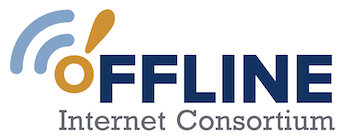
Report Outlines New Framework for Defining Meaningful Internet Connectivity
Version Française
Phoenix, Ariz.—Access to networked information for the half of the human race without reliable internet is the subject of a new report, The Power of Offline Internet: Beyond the Binary of Connectivity, commissioned by the Offline Internet Consortium. The report reframes how we think about internet connectivity through the lens of offline internet technologies and their proven capabilities in bridging the global digital divide.
While conventional approaches divide the have and have-nots of internet access, “offline internet” suggests a gray area—a continuum of connectivity, where innovative hardware and software solutions, localized content, digital skills, and supportive policies enable meaningful access to a wide array of digital content without the need for permanent internet connectivity.
Among its findings, the report highlights the need for a deeper understanding of how even indirect access to the world wide web can help address the range and complexity of digital disparities communities face worldwide, including poverty, censorship, and lack of infrastructure, and proposes a new gold standard for connectivity in achieving universal access.
“There are many reasons why people are unable to access the internet, and the solution is not as simple as high-speed broadband or Starlink,” said Ann Okerson, director of the Offline Internet Consortium (OLI). “When half the world can’t connect to the internet, that’s a huge equity issue in regard to information, education, and opportunity. OLI’s goal is to come together to advance offline internet solutions that ensure both universal and meaningful connectivity.”
Some examples of offline environments include prisons, refugee camps, and military facilities.
“Our hope is that this report will bring about greater advocacy and support for solutions that can connect people in all kinds of offline environments to information and opportunities that can be life-changing,” said OLI co-founder Jim O’Donnell of Arizona State University.
What is offline internet?
OLI works to raise awareness, support development of technologies and content, and connect the many diverse practitioners around the world that work in the space of offline internet. More than 20 international organizations work to advance offline-accessible solutions for digitally underserved communities in over 90 countries.
In the hyper-connected, ever-changing digital landscape, OLI members stand out as critical providers of affordable solutions that enable communities to connect to quality information online while very much being offline. While members may focus on different aspects of offline internet (some on software; others on hardware and content creation), their goal is the same: empowering users in offline environments with the resources to advance their education, strengthen their economies, and help lift their communities out of poverty. The outcomes have been remarkable—addressing critical gaps in West Africa’s educational landscape; improving girls’ access to essential learning materials; empowering vulnerable populations in Colombia and helping them safeguard their language; and delivering educational content to refugee camps and displaced communities worldwide.
“Policy-makers, development agencies, and leaders need to seize on the successes of offline internet if they want to deliver measurable short-term progress,” said O’Donnell. “Connectivity encompasses more than what long-term and expensive broadband deployments can deliver.”
# # # # #
The report, supported by the Arcadia Fund and featuring research conducted and written by Nicole Saad, director of the Open Learning Collective, provides a comprehensive analysis of offline internet and its impact, and offers strategic recommendations for stakeholders.

